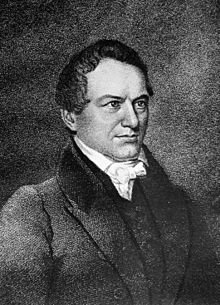
Back روبيرت يونج هاين ARZ رابرت وای. هآین AZB Robert Young Hayne German رابرت وای. هااین Persian Robert Young Hayne French רוברט היין HE Robert Y. Hayne Hungarian Robert Y. Hayne Swedish
Robert Y. Hayne | |
|---|---|
 | |
| 32nd Intendant of Charleston, South Carolina | |
| In office September 5, 1836 – September 4, 1837 | |
| Preceded by | Edward W. North |
| Succeeded by | Henry Laurens Pinckney as Mayor |
| 54th Governor of South Carolina | |
| In office December 13, 1832 – December 11, 1834 | |
| Lieutenant | Charles Cotesworth Pinckney |
| Preceded by | James Hamilton Jr. |
| Succeeded by | George McDuffie |
| United States Senator from South Carolina | |
| In office March 4, 1823 – December 13, 1832 | |
| Preceded by | William Smith |
| Succeeded by | John C. Calhoun |
| Chairman of the Senate Committee on Naval Affairs | |
| In office 1825–1832 | |
| Preceded by | James Lloyd |
| Succeeded by | George M. Dallas |
| 5th Attorney General of South Carolina | |
| In office December 18, 1818 – December 7, 1822 | |
| Governor | John Geddes Thomas Bennett Jr. |
| Preceded by | John Smythe Richardson Sr. |
| Succeeded by | James L. Petigru |
| 16th Speaker of the South Carolina House of Representatives | |
| In office November 23, 1818 – December 18, 1818 | |
| Governor | Andrew Pickens John Geddes |
| Preceded by | Thomas Bennett Jr. |
| Succeeded by | Patrick Noble |
| Member of the South Carolina House of Representatives from St. Philip's and St. Michael's Parish | |
| In office November 28, 1814 – December 18, 1818 | |
| Personal details | |
| Born | Robert Young Hayne November 10, 1791 St. Pauls Parish, Hollywood, South Carolina, US |
| Died | September 24, 1839 (aged 47) Asheville, North Carolina, US |
| Political party | Democratic |
| Spouse(s) | Frances Henrietta Pinckney Rebecca Mott Alston |
| Profession | Attorney, Soldier |
| Signature | |
| Military service | |
| Allegiance | United States of America |
| Branch/service | United States Army South Carolina militia |
| Rank | Captain Quartermaster General |
| Unit | 3rd South Carolina Regiment |
| Battles/wars | War of 1812 |
Robert Young Hayne (November 10, 1791 – September 24, 1839) was an American politician. He served in the United States Senate from 1823 to 1832, as Governor of South Carolina 1832–1834, and as Mayor of Charleston 1836–1837.[1] As Senator and Governor, he was a leading figure in the Nullification Crisis and, along with John C. Calhoun and James Hamilton Jr., a vocal proponent of the doctrines of states' rights, compact theory, and nullification; his 1830 debate in the Senate with Daniel Webster is considered a defining episode in the constitutional crisis which precipitated the American Civil War.
- ^ Encyclopedia of American Biography, p. 465.